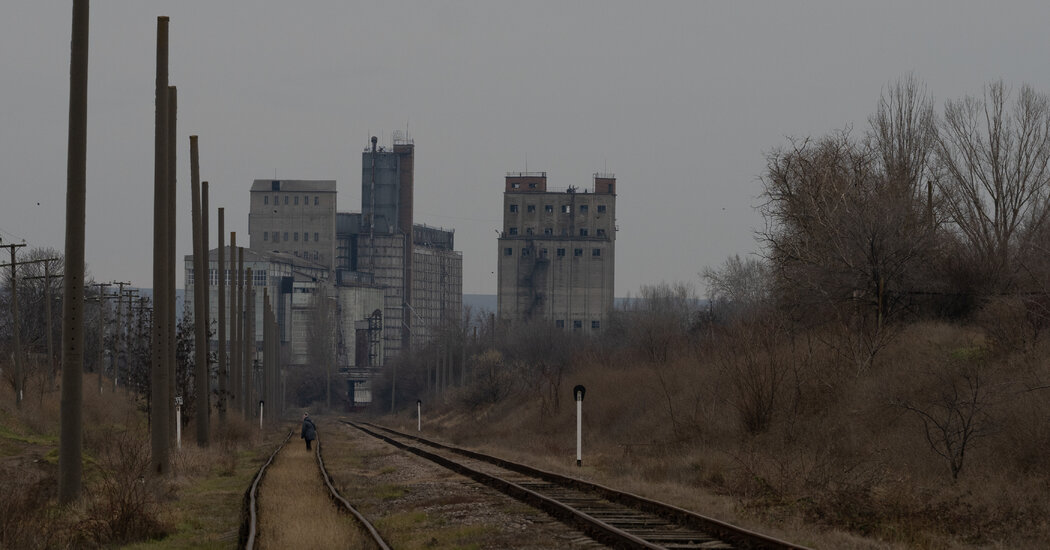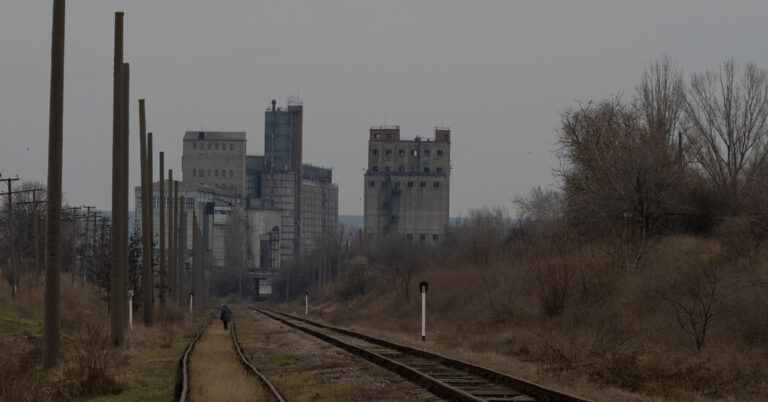The shop sold flowers and gardening tools to visitors coming right from the street, where a small breakaway region of Moldova has remained defiantly for more than 30 years, with the support of Russian troops.
After the gas supply from Russia was blocked on New Year’s Day, however, the shop mainly sold electric heaters to freezing residents of Transnistria, the self-proclaimed microstate in eastern Moldova.
Cheaper models are already sold out, a shop assistant said, but high-end heaters are selling fast, while 350,000 Transnistrians face an energy crisis that has closed factories, left Soviet-era apartment blocks without heat and hot water and raised questions about the survival of their independent Russian-speaking enclave.
The situation is so serious that the region’s president, Vadim Krasnoselsky – who heads an entity not recognized by all other countries, including Russia – sought to reassure his people on Thursday: “We will not allow a social collapse.”
“It’s difficult,” Krasnoselsky said, enumerating thousands of businesses, schools, farms and homes struggling without heat. Citizens showed “great responsibility,” he said, “by going into the forest to collect dead wood” to burn at home.
The crisis began on January 1, when Russian energy giant Gazprom stopped pumping natural gas through Ukraine, its main export route to Europe, after Ukraine refused to renew a five-year deal on the transit of gas.
In most places once dependent on Russian gas, such as Hungary, the consequences of the shutdown have been eased by alternative suppliers from the West. But Transnistria, a tiny patch of territory built on unwavering loyalty to Russia, faces an existential crisis.
Dorin Recean, the prime minister of Moldova, who has long called for the region to give up its claims to statehood, accused Russia of causing an “imminent humanitarian crisis.”
“By jeopardizing the future of the protectorate it has supported for three decades in an attempt to destabilize Moldova, Russia is revealing the inevitable outcome for all its allies: betrayal and isolation,” Recean said on Friday.
Distracted by the war in Ukraine and more cautious about investing resources, Russia has recently shown a greater willingness to cut its losses, particularly in Syria, where it stood on the sidelines last month as rebels toppled Russia’s closest ally. Moscow in the Middle East.
Alexandru Flenchea, Moldova’s former deputy prime minister responsible for trying to reintegrate Transnistria, said Russia is not yet ready to abandon the region, welcoming its use to exert military and political pressure on Moldova.
Russia’s desire for influence, Flenchea said, became more acute in October, when Moldovan voters narrowly approved amending the Constitution to block the country’s exit from Moscow’s sphere of influence, aligning itself more closely with Russia. ‘West.
But, Flenchea added, Russia’s willingness to let Transnistria freeze without gas or its main source of revenue – selling electricity to Moldova from a gas-fired power plant – suggested the region was in serious trouble.
“The whole model in Transnistria is based on free Russian gas. If there was no free Russian gas, everything would collapse,” he said. “But I don’t think Russia will allow this to happen anytime soon. He still needs it.”
Others see Transnistria’s ordeals not so much as a sign of Russia’s retreat but of its determination to divert Moldova from its pro-European path.
Also cut off from Russian gas, Moldova has in the past week switched to more expensive alternatives, including electricity from Romania. This prevented Moldova from cooling, but doubled the price of electricity for consumers, which could carry a heavy political price for the pro-Western government in this year’s elections.
Russia’s goal, said Vladislav Kulminski, a former government official now a member of the Institute for Strategic Initiatives, a Moldovan research group, “is to keep us in a gray zone by achieving an election result that brings a different government to power.”
“Everything was thrown up in the air,” he said. “We don’t know what shape it will take when all the pieces fall to the ground.”
A retro police state with its own currency and passports – and a successful football team funded by local tycoons – Transnistria has a large security service, buttressed by the Russians, and has worked hard to control what people hear about.
Transnistrian media, echoing Russian speeches, blame Ukraine, the United States and the Moldovan government for the gas cut. Rumors that Russian President Vladimir V. Putin might also be to blame are taboo.
The media blitz seems to be working.
“Putin would never abandon us,” said Grigory Kravatenko, a resident of Bender, an industrial city bordering territory controlled by Moldova.
Asked whether Transnistria would be better off being less aligned with Moscow, he added: “We are not for Russia. We are not for Moldova. We are not for Ukraine. We are for ourselves and we are all suffering.”
The stoves continued to work for a while after the Jan. 1 outage, thanks to the gas that was still in the pipes. But now they too are babbling.
A Transnistria resident who gave only her first name, Yulia, walking with her baby daughter along an abandoned railway track on Friday, said she was sure Russia would soon come to the rescue. “Of course they won’t let us die,” he said.
Victor Ceban, an Orthodox Christian priest in charge of parishes along the zigzag border, said he avoided talking about who was responsible. “Whatever you say to one person becomes someone else’s enemy,” he said.
In some places, the border is delimited by concrete barriers manned by Russians in camouflage. But in other places it is so unclear that it is easy to cross over into Transnistria. Last week, ushered through a checkpoint by a soldier with a Russian flag on his shoulder, journalists asked people at the bus stop if they were aware of Transnistria’s problems.
“Of course we do. This is Transnistria,” said an elderly woman.
Mr. Ceban, the priest, walking from house to house Friday through the Moldovan-controlled village of Varnita, offered blessings ahead of Orthodox Christmas and prayed that his mostly geriatric flock would not suffer long without heat .
When Transnistria, the most prosperous part of Moldova when both were part of the Soviet Union, broke away to form a renegade state in the early 1990s, the region boasted that it would become a Russian-speaking version of Switzerland – a refuge proudly independent of the unrest gripping Moldova, which was profoundly impoverished.
The breakaway region became a model for Russia’s ever-present push to maintain its influence in former Soviet lands by supporting separatists: first in Moldova, then in Georgia and eastern Ukraine. In all three countries, local militants backed by Russian force have declared their own microstates.
The deployment of Russian troops to Transnistria, originally as peacekeepers but still there decades after the fighting ended, ensured that Moldova could never retake the territory by force and undermined diplomatic efforts.
Equally important to Transnistria’s survival, however, has been Russian gas, supplied virtually free to keep a steel mill and other industries running – and to fuel the power plant that sells electricity to Moldova.
Moldova’s state secretary for energy, Constantin Borosan, said that, before the current crisis, electricity generated in Transnistria met about three-quarters of his country’s demand and provided about half of the breakaway region’s budget .
“These people were living off gas subsidized by Russia,” he said. “Now it seems that Russia has abandoned them.” He noted that Gazprom had ignored suggestions from Moldova that it could, using an alternative export route under the Black Sea, continue to supply gas to Transnistria if the Kremlin wanted.
“I don’t know what’s going on in Putin’s head,” he said.
Whatever Russia’s intentions, they are causing widespread pain not only in Transnistria, but also to residents of Moldovan-controlled territory.
Alexandru Nichitenco, mayor of Varnita, a village surrounded by Transnistria and dependent on its energy, said most of its 5,100 residents can no longer heat their homes. They faced disaster, he said, especially if normal winter temperatures – typically many degrees below zero – gripped the country.
He said he didn’t blame Transnistria: “They can’t do anything. Moscow controls everything over there.”
Veronica Ostap, a mother from Varnita struggling to feed her family without a working stove, said she was waiting for next week’s pay to buy an electric kettle. She was keeping a room warm with an electric heater so her three young children could sleep.
A Baptist Christian, she thanked God for keeping the temperature around freezing, at least during the day. “The Lord is trying to help us,” he said.
Ruxanda Spatari contributed reporting from Chisinau, Moldova and Natalia Vasilieva from Berlin.





